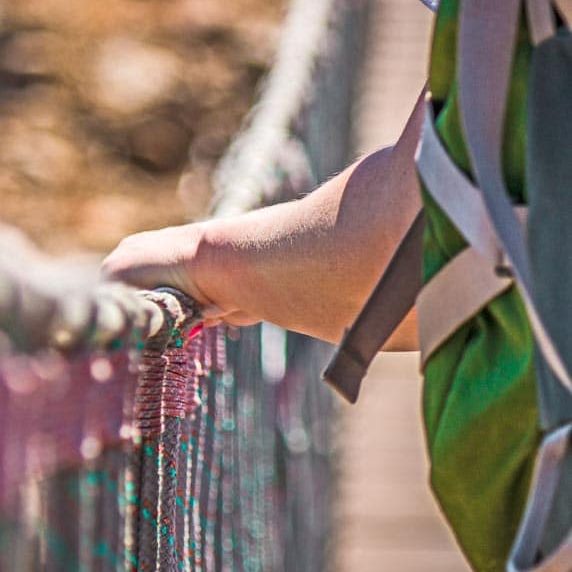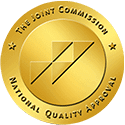
Breaking the Cycle: Treatment for Teenage Lying and Manipulation
Are you a parent struggling with a teenager who lies and manipulates? You're not alone. Wilderness therapy provides a solution for families like yours, offering a supportive and effective approach to help your child overcome these destructive habits. In this article, we'll take a closer look at how wilderness therapy helps break the cycle of teenage lying and manipulation.
Take our assessment for teenage lying & manipulation and see if a wilderness therapy program is right for your family.
Lying and manipulation are common behaviors among teenagers, but they can also be a cause for concern. A lying teenager is one who engages in dishonesty and deliberately misleads others by telling falsehoods. A manipulative teenager is one who uses cunning, deceit, or indirect methods to control or influence others for their own benefit.
Both lying and manipulation can have negative impacts on relationships and trust, and can be harmful to the teenager's mental health and well-being. It's important to understand that these behaviors can be the result of a variety of underlying factors, such as low self-esteem, anxiety, depression, or personality disorders.
Signs Your Teen May Need Treatment for Lying & Manipulation:
The signs of teenage lying and manipulation can manifest in physical, emotional, and behavioral ways. As a parent, it's crucial to be knowledgeable of these warning signs in order to effectively support and guide your teen. The following is a list of common indicators of lying and manipulative behavior in teens that parents should be aware of.
There are several signs that a teenager may be lying, including:
- Inconsistent or contradictory statements
- Avoiding eye contact or excessive blinking
- Answering questions with more questions
- Vague or evasive answers
- Strange or nervous body language, such as fidgeting or avoiding physical contact
- Sudden changes in behavior or mood
- Refusing to answer questions or being slow to respond
- Fabricating stories or details
- Being overly defensive or argumentative
- Showing little emotion or remorse when talking about the subject in question.
The signs of teenage manipulation can include:
- Playing one person against another
- Using guilt or emotional appeals to control others
- Blaming others for their problems or mistakes
- Being overly charming or flattering to get what they want
- Pretending to agree with others while secretly acting against their interests
- Making others feel guilty or ashamed for not complying with their requests
- Creating a false sense of urgency to pressure others into action
- Isolating individuals from friends or family members
- Using threats or intimidation to control others
- Being quick to anger or resorting to temper tantrums when they don't get their way.
Lying and manipulation are not always easy to detect and it's important to note that these signs do not always indicate that a teenager is lying or being manipulative. Teens may exhibit these behaviors for many other reasons.
However, if you suspect that your teenager is lying or manipulating others, it's important to address the issue in an open and honest manner. A mental health professional can provide support and guidance in addressing these behaviors and help your teenager develop healthy habits and relationships.
You Are Not Alone
RedCliff Ascent is there for you and your family.
Types of Lying Issues in Teens
Pathological lying and compulsive lying are similar concepts but are sometimes used to describe different types of persistent lying behavior.
Compulsive lying
on the other hand, is a type of lying behavior that is driven by an uncontrollable urge to lie, even when it is not necessary or beneficial. Compulsive liars may lie repeatedly and habitually, and may experience stress or anxiety when they are unable to lie.
Pathological Lying
also known as pseudologia fantastica, is a term used to describe a type of lying that is chronic and often exaggerated, with no apparent motivation or benefit to the liar. Pathological liars may create elaborate and fantastical stories that are not based in reality.
Signs of Compulsive & Pathological Teenage Lying
The signs of a compulsive lying teenager may include:
- Lying frequently, even when it is not necessary or beneficial
- Telling elaborate or fantastical stories that are unlikely to be true
- Being inconsistent in their stories or accounts of events
- Refusing to admit to lying, even when confronted with evidence to the contrary
- Becoming defensive or hostile when questioned about their lies
- Having trouble maintaining relationships due to trust issues
- Experiencing anxiety or stress when lying is discovered or when lying becomes difficult
- Continuing to lie despite negative consequences, such as getting into trouble or damaging relationships
- Feeling a sense of relief or satisfaction when lying is successful
- Being unable to control the urge to lie.
The signs of a pathological lying teenager may include:
- Lying repeatedly, even when it is not necessary or beneficial
- Telling elaborate, fantastic, or unbelievable stories
- Having difficulty maintaining relationships due to trust issues
- Refusing to admit to lying, even when confronted with evidence to the contrary
- Having a history of lying and being caught in the past
- Struggling with guilt or shame related to lying
- Being defensive or hostile when questioned about their lies
- Having trouble distinguishing between reality and fantasy
- Engaging in other behaviors that may be seen as irrational or abnormal
- Having a family history of pathological or compulsive lying.
It's important to note that compulsive and pathological lying are complex behaviors that can be caused by a variety of underlying factors, such as low self-esteem, personality disorders, mental health conditions like depression or anxiety, or neurological conditions.
Both pathological and compulsive lying can have negative impacts on relationships, trust, and mental health, and can be difficult to treat without professional help. If you suspect your teenager may be struggling with persistent lying behavior, it's important to seek the help of a mental health professional who can provide a proper diagnosis and treatment plan.
Is it Just Normal Teenage Behavior or Something More?
It can be difficult for parents to tell the difference between normal teenage behavior and behavior that requires treatment, but there are some red flags to look for. Some signs that your teenager's lying and manipulation may be severe enough to require treatment include:
Signs Your Teen May Need Treatment:
- Frequent and persistent lying, even when it is not necessary or beneficial.
- Struggling to maintain healthy relationships due to trust issues.
- Engaging in other harmful or destructive behaviors, such as substance abuse or self-harm.
- Experiencing negative emotional or psychological symptoms, such as anxiety, depression, or guilt.
- Struggling in school or other areas of life due to their lying and manipulative behavior.
- Refusing to admit to lying or manipulating others, even when confronted with evidence.
- Being defensive or hostile when questioned about their behavior.
Normal teenage behavior can include:
- Experimenting with new ideas, interests, and identities
- Questioning authority and testing boundaries
- Expressing emotions in intense or dramatic ways
- Seeking independence and privacy
If your teenager's lying and manipulation is having a significant impact on their life or the lives of those around them, it may be time to consider seeking the help of a mental health professional. A mental health professional can help diagnose the underlying causes of the behavior and provide support and guidance in addressing it.
What Causes Teens To Lie and Manipulate?
There are a variety of factors that can contribute to a teenager's lying and manipulation. Some of the most common causes include:
- Mental health conditions: Teens with mental health conditions, such as anxiety or depression, may lie or manipulate as a coping mechanism or as a symptom of their condition.
- Trauma or abuse: Teens who have experienced trauma or abuse may lie or manipulate as a way to protect themselves or to avoid facing painful memories or emotions.
- Developmental issues: During their teenage years, some teens may struggle with separating their thoughts and feelings from reality, which can lead to lying and manipulation.
- Lack of structure and boundaries: Teens who lack clear boundaries and structure may be more likely to engage in lying and manipulative behavior.
- Poor relationships: Teens who have negative relationships with their parents or family members may lie or manipulate as a way to test boundaries, avoid conflicts, or as a way to exert control.
It's important to remember that every teenager is different, and that the underlying causes of lying and manipulation can vary from person to person. If you suspect that your teenager's lying or manipulation is a cause for concern, it's important to seek the help of a mental health professional who can provide a proper diagnosis and treatment plan.
The Connection Between Teenage Lying and Unfulfilled Needs
Teenage lying and manipulation may indicate that they have unmet needs they are struggling to fulfill in a healthy manner. When this happens, psychologists refer to this behavior as a maladaptive coping mechanism. The following are common needs that teens may attempt to meet through lying and manipulation:
- Boosting self-worth: Teens who have low self-esteem may resort to lying or manipulation as a means of boosting their self-image or protecting themselves from criticism or rejection.
- Seeking emotional support and connection: Teens who don't feel emotionally connected to others may lie or manipulate in an attempt to gain attention, affection, or validation.
- Coping with unresolved emotional distress: Teens who are struggling with emotions may lie or manipulate as a way of avoiding their feelings or coping with difficult situations.
- Navigating identity struggles: Teens who are in the process of developing their identity may experiment with different personas through lying or manipulation, or may use these behaviors as a way of asserting control.
- Improving communication skills: Teens who struggle with communicating their needs effectively may resort to lying or manipulation as a means of getting what they want.
- Finding positive role models: Teens who lack positive role models may use lying or manipulation as a means of filling the void left by absent or unhealthy role models.
- Building healthy relationships: Teens who are struggling to build healthy relationships may use lying or manipulation as a means of asserting control or avoiding rejection.
- Regulating emotions: Teens who struggle with regulating their emotions may resort to lying or manipulation as a way of avoiding difficult feelings or regaining control.
- Feeling emotionally safe: Teens who don't feel emotionally safe may use lying or manipulation as a means of protecting themselves from harm.
- Receiving emotional validation: Teens who don't feel emotionally validated may lie or manipulate in an attempt to feel seen, heard, and understood.
- Feeling in control of their life: Teens who feel out of control may lie or manipulate as a way of feeling a sense of control of anything in their lives.
It's important to remember that these needs may not be consciously recognized by the teenager, but they are still driving the behavior. Helping a teen address and fulfill these needs in a healthy way is key to breaking the cycle of lying and manipulation.
Importance of Early Intervention & Treatment for Teenage Lying & Manipulation
Early intervention is important in treating teenage lying and manipulation because it can help address the underlying issues that contribute to these behaviors and prevent them from becoming ingrained and difficult to change. By addressing the behavior early, parents can help their teen develop healthy coping mechanisms, improve their self-esteem, and develop better communication skills, all of which can reduce the need for lying and manipulation.
Some reasons why early intervention is important include:
- Preventing negative consequences: Early intervention can help prevent negative consequences such as substance abuse, criminal behavior, or long-term mental health issues from becoming entrenched.
- Building resilience: Early intervention can help build resilience and coping skills in teenagers, which can help them better manage stress and challenges in the future.
- Improving outcomes: Early intervention can improve a teenager's outcomes, including their academic performance, relationships, and overall well-being.
- Addressing underlying issues: Early intervention can help identify and address underlying mental health or developmental issues, which can be a root cause of teenage lying.
- Improving access to resources: Early intervention can help ensure that a teenager has access to the resources and support they need to overcome challenges and develop positive coping strategies.
- Building trust: Early intervention can help build trust between parents and their teenager, which can be critical in ensuring that the teenager is receptive to support and guidance.
The role of early intervention is to provide support, guidance, and education to both the teenager and the family, so that the teenager can learn healthy ways of getting their needs met, and the family can learn how to support the teenager in a positive and effective way. Early intervention can also prevent the development of more serious mental health issues and reduce the need for more intensive treatment down the line.

Not Seeking Treatment Can Be Harmful
Leaving teenage lying and manipulation untreated can have both short-term and long-term effects on the mental and emotional well-being of the teenager and those around them.
Short-term effects of untreated teenage lying and manipulation can include:
- Damaged relationships with family and friends
- Decreased trust and credibility
- Increased stress and anxiety
- Difficulty in developing healthy coping skills
- Engagement in more harmful or illegal behavior
Long-term effects of untreated teenage lying and manipulation can include:
- Chronic patterns of lying and manipulation
- Low self-esteem and poor self-image
- Difficulty in forming and maintaining healthy long-term relationships
- Mental health problems such as anxiety and depression
- Criminal behavior and involvement with the justice system
It is important to address teenage lying and manipulation early in order to minimize these negative consequences and help the teenager develop healthy coping mechanisms, better communication skills, and improved self-esteem.
Early Intervention Is Important For Healing Your Teen & Family
Early intervention refers to recognizing the warning signs of lying teenage behavior and acting before it gets worse. When you realize that your teen is struggling, it’s important to get professional treatment before it becomes worse.
Early intervention can help parents and families of lying teenagers in several specific ways, including:
- Providing support and guidance: Early intervention can provide parents and families with the support and guidance they need to navigate the situation effectively. This can include information on effective communication strategies, coping skills, and resources available to help manage the situation.
- Improving relationships: Early intervention can help improve relationships between parents, teenagers, and other family members. This can include teaching parents how to better understand and communicate with their teen while also improving the teenager's relationships with their peers and family members.
- Reducing stress for the whole family: Early intervention can help reduce stress and anxiety for parents and other family members, as well as for the teenager themselves. By receiving support and guidance, families can feel more confident and better equipped to manage the situation effectively.
- Preventing further harm: Early intervention can help prevent further harm to the teenager and the family. This can include addressing behavioral issues before they escalate and helping the teenager access the resources and support they need to overcome challenges.
- Building resilience: Early intervention can help build resilience and coping skills in parents and family members, which can help them better manage stress and challenges in the future.
- Improving overall well-being: Early intervention can help improve the overall well-being of everyone involved. By addressing lying and manipulative behavior early on, families can take an important step toward promoting positive mental health and well-being for all members of the household.
Plus, it could help reduce long-term medical costs and the overall burden on family and friends. Overcoming teenage lying and manipulation is possible with the right tools and treatment programs. You can help your teen get the support they need.
Treatment for Teenage Lying: What Are Your Options?
There are several treatment options available for parents of teens struggling with lying and manipulation, including:
- Outpatient therapy: This involves regular counseling sessions with a mental health professional in an outpatient setting, usually at a clinic or private office.
- Day treatment: This is a more intensive form of outpatient therapy, where the teen attends therapy for several hours a day but returns home at night.
- Residential treatment: This involves the teen living in a residential facility, usually for an extended period of time, where they receive round-the-clock care and treatment for their lying and manipulation.
- Wilderness therapy: This is a form of treatment that combines outdoor activities and therapy sessions to help teens develop new coping skills and improve their mental health.
It's important to find a treatment option that fits the individual needs and circumstances of the teen and their family. A mental health professional can help assess the situation and make a recommendation.
What is Wilderness Therapy?
Wilderness therapy is a type of program for teens struggling with lying and manipulation that uses nature, wilderness activities, and therapy as a means to address and heal their individual struggles. Wilderness therapy takes full advantage of the outdoors and its ability to foster change. The outdoors provide teens with a contrasting environment to observe aspects of themselves that are often overlooked in traditional talk therapy.
As the leader in wilderness therapy, RedCliff Ascent is an effective treatment program for struggling teens aged 13-17. RedCliff Ascent’s safe, nurturing, and supportive environment provides teens with the skills they need to cope in a healthy and age-appropriate way.

Benefits of Wilderness Therapy for Treating Teenage Lying
Being immersed in nature can have a profound impact on a teenager. It improves their mental, emotional and physical health. When combined with a research-backed clinical approach, a therapeutic wilderness experience helps heal teens and their families. Here are five specific benefits your family can expect to see while your teen is in wilderness therapy.
98% of students report feeling connected to RedCliff's staff and one or more of their peers.
Upon completion of the program, 86% of parents reported improvement in their child's problems when compared to when they entered
12 months after treatment 86% of parents reported that their child's problems are improved since they completed treatment
How Does Wilderness Therapy Work?
RedCliff Ascent has helped teens struggling with lying and manipulation for almost 30 years and has conducted research since its inception. Through our research, we have identified seven principles that actually make a difference in helping your whole family recover from your teen's behavioral struggles.

Exclusionary criteria for RedCliff Ascent include:
- Teens younger than 13 and older than 17.5
- Teens with a physical limitation, i.e. wheelchair, crutches, etc.
- Teens with conditions that need intensive medical care or monitoring, i.e. eating disorders, diabetes, etc.
- Teens with a history of violence or sexual assault
- Teens with psychosis or schizophrenia
RedCliff Ascent does not take Medicare or Medicaid.
What Our Clients Say About RedCliff Ascent
I’d like to let you know how delighted I am with the RedCliff program and how impressive the hard work and dedication of the staff is...We feel that your program has very probably saved this child’s life and given us back our son.
- Kathy
We are very pleased with [our daughter's] self-improvements. A year ago we would not have dreamed all this to be possible! The path she head down was self-destruction. The impact of the RedCliff program is what turned [her] around. Our headstrong daughter was able to take stock of her past behavior, deal with her anger towards us, and begin to move in a more positive direction.
Even though sending her to RedCliff was a gut-wrenching decision, we know we did the right thing. We are thankful for the help and insight you gave to her and us.
- Clark and Irene
Since [our son] went to RedCliff we have all been transformed, but none as much as he. All of his teachers had nothing but good things to say about him. There have been no behavior issues at school this year. As a matter of fact, his teachers stated that they would like it if they had more students like Rob in their classes. I cried again at this meeting, but this time they were tears of joy.
- Julie


Backed by The Joint Commission which ensures programs adhere to the highest quality of clinical and medical practices.

Designated as a NATSAP Research Program, showing our commitment to well-researched practices in our program.

We are also OBH Accredited through the Association of Experiential Education (AEE) which regulates wilderness therapy practices.

Full member of the National Association of Therapeutic Schools and Programs (NATSAP), which ensure regulation of programs that serve children and adolescents.

RedCliff Ascent is fully licensed in the state of Utah.

Backed by the Association of Experiential Education (AEE) that ensures programs maintain appropriate professional behavior and risk management.

Founding member of the OBH Council (Outdoor Behavioral Healthcare Council).

Founding member of Choose Mental Health, guiding families with questions about mental health.
Every teen’s strengths and challenges are different. Complete the no-obligation teen assessment below to help us understand your family’s needs.
We respect your privacy and will never share your information.
We’re here to help - take the first step and contact us to see if wilderness therapy could be the path to healing for your family.
